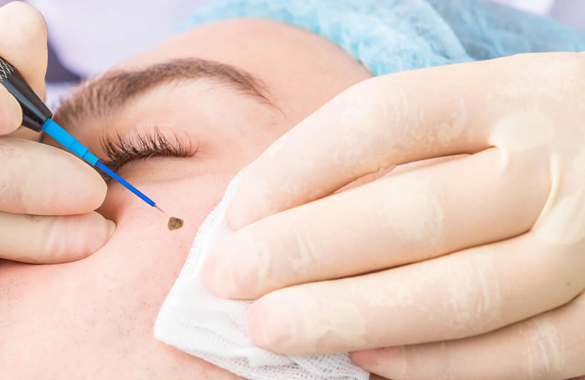Quick Inquiry


Looking to finally remove that mole you’ve been wanting to get rid of for years? Regain peace of mind and get Mole removal Treatment in Delhi at Dermasure. Know everything about mole treatment procedure, necessary criteria, and duration right here.
Most moles are harmless, despite existing since birth or developing over time. Moles can be flat on the surface or have a bumped experience, though the latter may require medical supervision. For a mole that’s suspected to be cancerous, a dermatologist may suggest surgical removal in order to prevent it from metastasizing.
On the contrary if you wonder what your skin would look like without a mole, getting it removed is always an option. Our skin clinic in Delhi provides treatment for mole removal through surgical excision, laser technology, as well as surgical shaving.

Moles are characterized as brown spots, but they also come in different shapes, sizes, and colours:
Moles occur when cells in the skin melanocytes grow in clumps or clusters. Melanocytes are distributed throughout the human skin and trigger the production of melanin, which in turn provides the colour to the skin.
Most people have approximately 10 to 40 moles on their body and many of them develop by the age of 50. Some moles may fade or change over time, and due to the body’s natural processes such as adolescence and pregnancy may cause moles to become larger and darker.
Mole removal treatment can vary for different cases, and these are recommended based on the situation, type of moles, intensity, and the desired outcome for patients.
At Dermasure, we adopt minimally-invasive mole removal techniques that are administered by our lead dermatologist and skin expert, Dr. Shirin Bakshi:
Please note: Some mild and temporary side effects of mole removal treatment may include mild pain, infection, temporary redness at the site, or the discharge of pus. Some patients may have allergic reactions to anesthesia, which could lead to nerve damage. In very rare cases, sepsis may develop. The size of the scar may be influenced by the initial mole size, with larger moles potentially resulting in larger scars. However, with time, scars typically fade and become less noticeable.
Moles may occur in different shapes, sizes, and colours, but some forms may raise concern and instigate a need to take prompt action. For aesthetic reasons or for mitigating health risks, mole removal treatment in Delhi is always worth it, as it can help you get the desired results with minimal downtime and enduring results.
Consult our top dermatologist and mole removal specialist Dr. Shirin Bakshi at Dermasure clinic. We’re always at your service to address your concerns, provide you with the finest treatment options, assisting you with financing options for therapies.
Mole removal is generally a safe procedure. However, as with any surgical procedure, there is a small risk of infection, bleeding, scarring, or changes in skin colour. Your dermatologist will discuss the potential risks and address any concerns you may have.
No, Mole removal treatment is a minimally invasive procedure that is performed under local anesthesia. You may experience some mild soreness or discomfort after the procedure, but it can be managed with over-the-counter pain relievers.
Mole removal is a session of 5 – 10 minutes, wherein local anesthesia is administered and the mole is removed surgically or by laser. Depending on your individual case, your dermatologist may recommend removing one or more moles at a time.
It could happen that due to the regrowth of mole cells that were left behind during the removal process, the mole could come back. Regular follow-up appointments with your mole removal dermatologist can help ensure proper monitoring.
Leave Them To #1 Skin & Hair Specialist In Delhi